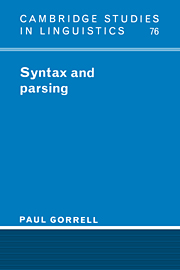4 - Properties of the parser
Published online by Cambridge University Press: 30 March 2010
Summary
Unfortunately, there is as yet no standard terminology in this field, so the author has followed the usual practice … namely to use words that are similar but not identical to the terms used in other books.
Donald E. KnuthIntroduction
The properties of the parser described in this chapter are motivated by the form of the grammar and the speed and efficiency with which interpretive processes are able to make use of the structural representation constructed by the parser. Before detailing the specific properties of the parser I will first consider some general issues. One important question concerns the role of primary structural relations in a principle-based parser and its grammatical database.
Following the work of Pritchett (1987, 1992), a number of proposals of the last few years have sought to move from form-based parsing strategies such as Minimal Attachment (Frazier 1978) to content-based strategies (e.g. Pritchett's 1992 Generalized Theta Attachment or Crocker's 1992 Argument Attachment). There appear to be two motivations for this. The first is based on the intuition that the form of a phrase marker (however that is instantiated, e.g. as a tree or reduced phrase marker, etc.) is, in some sense, derivative or secondary whereas the licensing relations (theta, case, etc.) are more central in current linguistic theory. That is, the role of a particular structural form is to allow certain licensing relations to hold between elements in the representation. Thus, content-based approaches are taken to be more “grammatically responsible” than form-based models.
- Type
- Chapter
- Information
- Syntax and Parsing , pp. 94 - 148Publisher: Cambridge University PressPrint publication year: 1995

